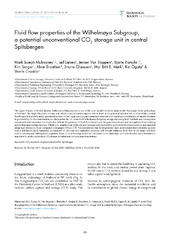Fluid flow properties of the Wilhelmøya Subgroup,a potential unconventional CO2 storage unit in central Spitsbergen
Mulrooney, Mark Joseph; Larsen, Leif; Van Stappen, Jeroen; Rismyhr, Bjarte; Senger, Kim; Braathen, Alvar; Olaussen, Snorre; Mørk, Mai Britt Engeness; Ogata, Kei; Cnudde, Veerle
Peer reviewed, Journal article
Published version

Åpne
Permanent lenke
https://hdl.handle.net/1956/19785Utgivelsesdato
2019Metadata
Vis full innførselSamlinger
- Department of Earth Science [1050]
Originalversjon
https://doi.org/10.17850/njg002Sammendrag
The Upper Triassic to Middle Jurassic Wilhelmøya Subgroup forms one of the more suitable reservoir units on the Norwegian Arctic archipelago of Svalbard. The target siliciclastic storage unit, which is encountered at approx. 670 m depth at the potential injection site in Adventdalen, central Spitsbergen, is a severely under-pressured (at least 35 bar), tight and compartmentalised reservoir with significant contribution of natural fractures to permeability. In this contribution, we characterise the 15–24 m-thick Wilhelmøya Subgroup storage unit using both borehole and outcrop data and present water-injection test results that indicate the presence of fluid-flow barriers and the generation of new, and propagation of pre-existing natural fractures during injection. Whole core samples from drillcores and outcrops were sampled for pore network characterisation and analysed using high-resolution X-ray computed tomography (Micro-CT). We demonstrate that heterogeneities such as structural discontinuities, igneous bodies and lateral facies variations, as examined in well core and equivalent outcrops, will strongly influence fluid flow in the target reservoir, both by steering and baffling fluid migration. Many of these heterogeneities are considered to be subseismic, and their detailed characterisation is important to predict subsurface CO2 storage potential and optimise injection strategy.
